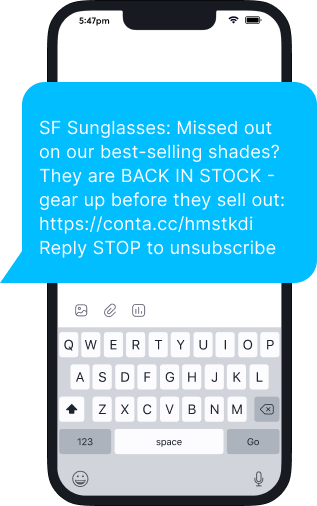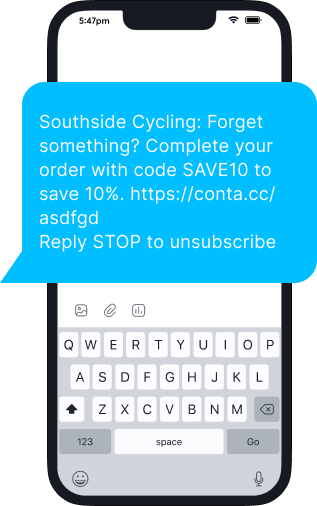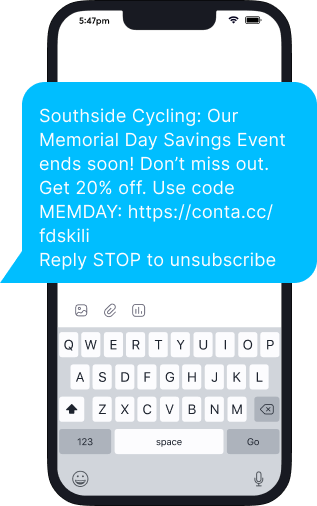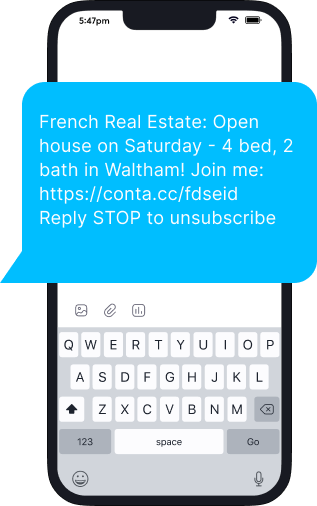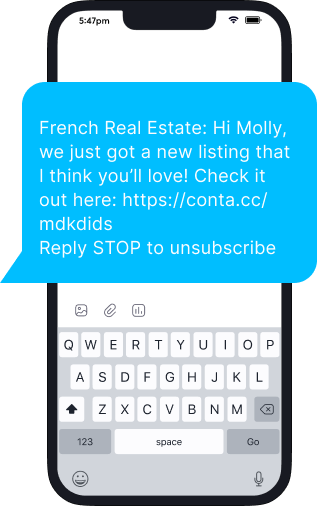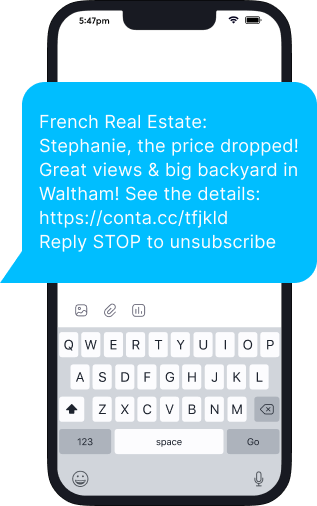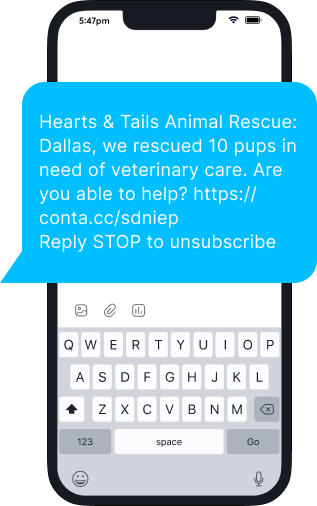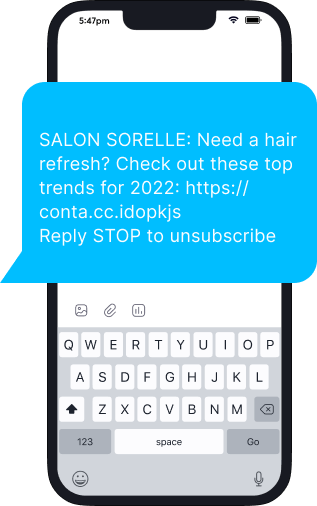Text messages are a part of everyday life. We use them throughout our day, every day, to communicate with one another while we’re apart.

And while we all use text messages in our private lives, most of us also receive SMS marketing messages from companies and organizations that we do business with.
What is SMS marketing?
SMS stands for “short message service.” SMS marketing helps your business send text messages to customers or clients who’ve opted in to receive timely communications from your business or nonprofit.
Businesses use SMS to send marketing messages to subscribers about limited-time offers, sign-up confirmations, event announcements, appointment reminders, and more.
Is SMS marketing legal?
SMS marketing is legal when you obtain consent from your subscribers and your business upholds the following guidelines set forth by the Federal Communications Commission (FCC) and the Federal Trade Commission (FTC).
The FCC’s Telephone Consumer Protection Act (TCPA) requires that businesses gain consent before sending SMS marketing text messages. The act also requires SMS marketing text messages to include the following:
- Description of the program
- Shortcode or phone number messages will come from
- The phrase “Msg & Data rates apply.”
- The number of messages subscribers can expect to receive
- Instructions on how to opt-out
- A link to your terms and conditions or privacy policy
- Contact and support information
The FTC’s CAN-Spam Act helps to protect consumers from misleading information and poor business practices. The CAN-Spam Act instructs businesses to avoid the following bad business practices:
- Failing to identify a message as an advertisement
- Misleading or false information in subject lines, header content like sender information (To:, From:, Reply to:) and message body content.
- Falsifying business location
- Failing to inform subscribers how to opt-out
- Failing to honor unsubscribes
Comply with the TCPA and CAN-Spam Act to ensure your SMS marketing practices remain legal.
How to use SMS marketing
Use SMS to quickly get in touch with customers, answer questions, and direct them to take action.
To create and send successful SMS text messages for your business, make sure to follow these guidelines:
Character count and tone
While you want to be conversational, make every character count when you begin sending SMS marketing messages for your business. 160 characters (including spaces) is the standard for SMS marketing messages (70 when you include an emoji).
Be friendly and informative with your messaging, reinforcing your brand voice in the process. Have a business geared at younger clientele? You might sacrifice 160 characters for an emoji that says it all.
Respect sending times
No one wants to be bothered by marketing text messages at 2 a.m. Make sure to respect sending times — this means only sending SMS marketing messages between the hours of 8 a.m. and 9 p.m.
Frequency
Just like respecting quiet hours, you do not want to bombard your subscribers with too many messages. Send SMS marketing messages when it matters to keep subscribers informed without overwhelming them with updates.
Value
SMS marketing messages should provide your subscribers with value. From promo codes to confirmation information, clarify what subscribers will gain from your business.
Types of SMS marketing
From abandoned cart messages to appointment reminders, SMS text message marketing is no longer just for large retail businesses.
Here are some common types of SMS marketing:
- Appointment reminders
- Shipping confirmations
- Flash sales
- Product launches
- Discounts and exclusive offers
- Abandoned cart reminders
- Seasonal reminders and sale promotions
Benefits of SMS marketing for small businesses
SMS text message marketing helps your business get up close and personal with subscribers — driving your message right into the palm of their hand. Here are some of the major benefits of introducing SMS text messages into your business’s marketing strategy.
Building relationships
As a small business owner, your greatest advantage is the relationships you build with your customers. By combining SMS marketing with your other marketing channels, you can boost your company’s average user lifetime by 76% all while communicating timely information to your audience when and where they want to receive it.
Directness
The success of SMS marketing hinges on its ability to get important messages into the hands of your subscribers. It’s direct and immediate. With no spam folder and 80.5% of consumers checking their text notifications within five minutes, your marketing messages always get seen.
Cost-effective
SMS marketing allows businesses to reach a wide audience at a low cost, making it an attractive option for businesses with limited marketing budgets. Because of its newness in the digital marketing sphere, you’ll often find digital marketing software platforms offering SMS marketing services as an add-on feature.
Brand awareness
Connect your brand messaging to your subscribers instantly by building a conversation through SMS text messages. Send information about product launches, flash sales, and reminders to give value and reinforce your brand.
High open rates and conversions
With 91% of consumers interested in signing up for texts and open rates as high as 98%, SMS marketing is an impactful tool to get your message out to subscribers and encourage them to take action.
What a small business should be using SMS for
What can’t you use it for? From abandoned cart messages to appointment reminders, reservation confirmations, donation drives and flash sales, SMS is not just for large retail businesses anymore.
As a small business owner, your greatest advantage is the relationships you can build with your customers.
SMS text message marketing offers an additional way to build those relationships by communicating timely information to your audience when and where they want to receive it.
That’s why every business or nonprofit can benefit from using text message marketing as part of their marketing strategy, no matter how large or small.
5 industry-specific SMS marketing sequence examples
Still wondering how you can use text message marketing for your small business? Take a look at these examples:
Retail:
Retail and e-commerce businesses can use text message marketing to share promotional or sales notifications, send abandoned cart reminders, build anticipation for new and seasonal products, welcome and nurture new customers, and even ask for reviews after a purchase.
Real estate:
In real estate, you can use SMS to grow your client base and deepen connections. Use SMS marketing to welcome and nurture new leads, share information on new area listings, provide invitations and reminders for open houses, alert clients to price and status changes, and even ask your client to leave a review online.
Plus, you could send a text invitation and reminders when you’re running a client appreciation event.
Nonprofit:
SMS is a great way to keep your community informed, active, and growing. Your nonprofit can send messages around your fundraising events, such as save-the-dates, registration updates, and even a thank you message after your event is complete.
SMS is a great opportunity to alert members when you’ve sent an important email or newsletter update that requires a timely response. Plus, you can send alerts and notifications about your cause, welcome new subscribers, raise emergency funds, and share updates on your progress.
A few other ideas include sharing inspirational messages around your cause and even reminders for healthy habits like drinking water, working out, and meditating.
Services:
SMS is practically made for the service industry. Use text marketing to confirm appointments and cancellations, send appointment reminders, notify customers of last-minute openings and missed appointments, announce product sales or service discounts, or send reminders to check email for service contracts or receipts.
B2B:
If you’re in the business-to-business (B2B) world, you can use SMS too.
Consider sending event invitation reminders, appointment reminders, alerts on new downloads and helpful content, company announcements, order management, or product and service updates.
What are the most important features of a text message marketing platform?
There are plenty of platforms on the market to consider. Your needs will of course vary depending on your industry but make sure that you’re getting these features from the platform you decide to use.
Compliance and consent management
Will the platform ensure that you will be in compliance without you having to think about it?
Make sure that the SMS text marketing platform you’re looking at does the following:
- Requires recipients to opt in
- Has automatic quiet hours
- Requires an easy opt-out option with every text
Easy-to-use editor
Text message marketing is desirable because it’s fast. If you’re having trouble figuring out the editor, you’re losing time writing texts that resonate with your audience. Your editor should give you the options to personalize messages and easily create an opt-out phrase.
If you’re planning to send bulk messages to multiple customers at once, find a platform that makes it easy to manage your customer database. It should give you the option to create lists and market segments.
A good editor will have a dashboard that’s easy to navigate with clear headings for each section. Use a program that offers templates for various message types so that you can write your texts quickly with language that’s more likely to convert. These templates are also great for writing automated responses.
Mobile keywords and shortcodes
Dedicated keywords or shortcodes like “YES” to opt-in and “STOP” to opt-out are examples of mobile keywords that can trigger automated actions like customer opt-ins and follow-up messages.
Personalization options
You want your business’ marketing messages to feel safe and trustworthy to the individual receiving them. Personalization options, like including a dynamic field to feature the name of the recipient, will help make your subscribers feel comfortable and special to your business.
Text-to-join and lead generation landing page
Investing in a platform that includes a text-to-join feature will help business’ to easily opt-in subscribers to their marketing text messages. Provide potential subscribers with a phone number to text in order to be added to your business’ SMS marketing list. Invite customers who are subscribed to your business’ text message marketing to join your email list by sending a link to a lead generation landing page.
Dedicated phone number
To save time and money, you may be tempted to use your personal or business cell phone number to send and receive SMS messages. But this makes it harder to manage once you start sending out messages in bulk.
Look for a text message marketing service that provides dedicated toll-free and local phone numbers. With these services, you can manage your messages in one spot — the same dashboard you use to compose your texts.
Contact management
A contact management tool makes it easier for you to send bulk messages, segment your contacts, and personalize your messages. For example, if you want to send an automated happy birthday coupon to members of your loyalty program through SMS messages, you can program each member’s birthday into the system and generate an automated message.
If you’ve segmented your list, a contact management tool offers reports that can help you see your most valuable segments. When you’ve identified your MVPs, you can engage them with special offers. Or you can switch up your messages to underperforming segments and see what gets them to engage.
Automation
Speaking of automated messages, any good text messaging service will let you create and send automated messages.
At the very least, set up an automated welcome series of messages thanking customers for subscribing to your text messages. These messages would be triggered by anyone who opts in to receive texts from you.
Add value to your list immediately by including a one-time discount or offer to people who sign up for your texts.
Other automated text messages include personalized promotions that send around birthdays, anniversaries, and holidays.
Use the automated message feature to create abandoned cart texts to notify customers who have been shopping on your site without completing their purchase. If you’re managing a restaurant, you can also use the abandon cart principle when a customer doesn’t finish booking a reservation or making a takeout order.
Integrations
Depending on your business, your SMS marketing platform will offer different integrations. If you’re running a nonprofit, you may integrate your SMS with your donation software, so people can click a link or text a code to make a simple donation.
SMS platforms can integrate with scheduling and conferencing apps, updating your calendar in real-time whenever someone texts you to make an appointment. This keeps you from accidentally double-booking and makes it easy for your clients to choose a time that works for them.
Find a tool that integrates with your preferred customer relationship management (CRM) software to track different interactions with each customer.
Reporting
Measure the analytics of each communication channel to gauge its effectiveness. Look for a tool that generates reports on how many people opened your text and for how long they engaged with your landing page if they clicked on the link.
You can also look at other reports like how many people opted out after each campaign, how many new customers signed up in a given period, and how your subscribers found you. Some platforms let you measure a campaign’s success in dollars, tracking revenue attributed to promotional offers using a specific landing page.
Scalability and reliability
You want your list to text message marketing subscriber list to grow over time, make sure the platform you select can grow with your business. Take note of platforms subscriber thresholds and reliability. You do not want to invest in a platform your business will outgrow to quickly or one that cannot successfully deliver messages to your subscribers.
Why email, SMS marketing, and social media are better together
Using SMS doesn’t mean you should drop the use of other marketing channels such as email marketing and social media. In fact, customers prefer it when their favorite brands use more than one marketing channel to engage them.
In particular, SMS and email marketing are more effective when combined because they’re both permission-based marketing channels.
When people sign up to receive your messages, they’re not just giving permission for you to send them marketing messages; they’re asking you to send them. They’re showing that they’re interested in your business, and they want to receive more information from you.
Whether it’s the latest news on industry trends or a flash sale on cat toys, it’s up to you to send timely, targeted messages on the channels your subscribers prefer.
Doing so will ensure you get the best results possible. And, because not everyone likes to receive the same messages the same way, it’s important to use your marketing channels both separately (omnichannel marketing) and together (cross-channel marketing).
The trick is to know the unique aspects of each channel and how to use them.
Email marketing gives you ownership of your list and your ability to connect with your audience. It allows you to send personalized, targeted messages on your terms. It’s perfect for regular newsletters and messages with enticing images and intriguing snippets that lead back to your website, blog, or online store. However, you also have to compete for your reader’s attention in the inbox.
Social media allows you to reach new people and share beyond your existing email list. But, algorithms can limit your reach, and the social media channel can control how, when, and if you can communicate with your subscribers. And, because social media success relies on your action and interaction, it can be time-consuming. However, social media is perfect for building brand awareness and growing your list.
SMS marketing is much like email marketing; it also gives you ownership of your list and your ability to connect with your audience, as well as allowing you to send personalized, target messages on your terms. However, these messages are more immediate than email and require clear and succinct messaging. This makes text message marketing perfect for sending exclusive messages that require a timely response.
Just remember, no one wants to have their phone pinging all day long, so be careful not to abuse this connection, or you’ll turn people off.
When planning your marketing strategy, keep in mind that even though you should be using these channels together, you don’t want to repeat the same message on every channel.
While we recommend occasionally mentioning what’s going on in other channels or with your campaign, you’ve got to have a reason to be there, and you must pay attention to how you’re using each channel — individually and together.
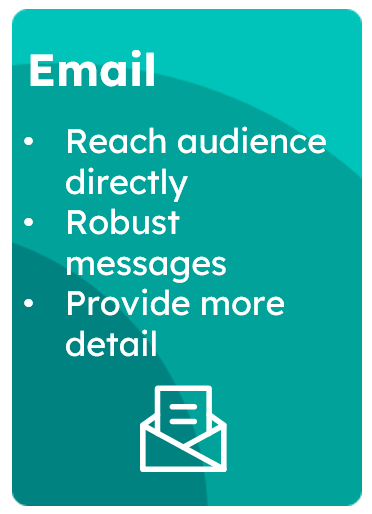
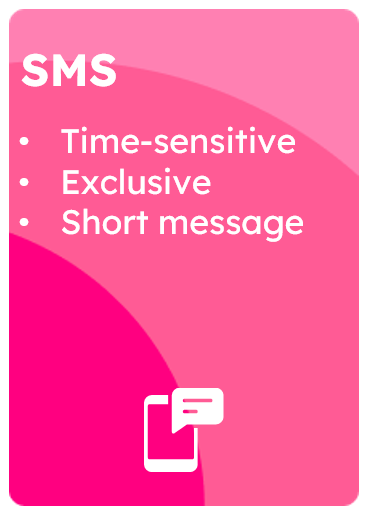
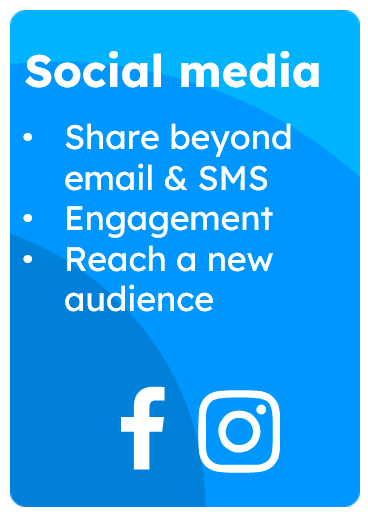
SMS best practices
Growing your SMS marketing list is just as important as growing your email list and social media connections. After all, the power of your digital marketing efforts lies in reaching your customers and customizing your message to their wants and needs.
Start by announcing the new communication channel to your email recipients and include a call to action (CTA) with a link that directs them to your landing page or sign-up form, where they can enter their mobile phone number. Be sure to tell them what they’ll get out of it — from a special discount code for joining to early or exclusive access to sales or industry information.
Set achievable goals for your SMS campaigns
As with all marketing efforts, without setting a goal for your text message marketing, your messaging will lack focus, and you won’t know if your actions are working. So, always set a goal for every campaign. Whether that’s to get 100 opens or to increase sales on a specific item by 10%.
Make data-driven decisions
This goes along with setting goals. Once you know what your goal for a campaign is, set KPIs (key performance indicators) to check your reports against.
If you start out your first campaign to get 100 recipients to read your message, check your report to see the open rates. If the report says that you had 100 opens, then you reached your goal. If it’s less than 100, see if you can figure out why.
Pay attention to when you send and how often
While you want to keep your subscribers informed, respect sending times as per federal guidelines and test frequency to prevent future dropoff from your SMS contact list.
Send updates in real-time
Use SMS marketing messages to send real-time updates to your subscribers. Having a flash sale or a inclinement weather for an event? Quickly send a text to keep your contacts in-the-know.
Revise and repeat
If you don’t get the results you’re looking for in a campaign, don’t chuck it. Take a hard look at your campaign and your reports and see where the weak link is.
Were your open rates low? Maybe you need to try writing a better headline.
Were open rates high but click-through rates low? Double-check the link in your message. Was it working properly? Was it clear what they needed to do to get the offer?
Did sales underperform? Was the offer clear to your subscribers? Was your offer something your recipients would really be interested in?
When you use your reports to find the weakness in your campaign, you can work to improve that part of your campaign and then try again.
SMS text message marketing in Constant Contact
Just like with email marketing, using a trusted platform can help take the guesswork out of regulatory requirements — and even some best practices.
With the SMS marketing feature within Constant Contact, many of the best practices outlined above are taken care of automatically, so you don’t have to worry about them, including:
- Restricting SMS messages to the appropriate hours of communication
- Identifying your company in each and every message
- Utilizing a dedicated local number rather than a toll-free or out-of-area number for best engagement
- Giving your recipients required disclosures, as well as opt in and opt out information
- Shortening links for clear, succinct marketing text messages
Using a trusted platform also has the advantage of using proven tools — like landing pages and sign-up forms – to help you build your SMS subscriber list.
By managing your SMS and email marketing within the same tool, you have the ability to superpower your new SMS marketing campaigns with the information you already have about your loyal customers and your interested prospects.
Finally, once you have launched your first SMS marketing campaign, you can see the outcomes alongside your other marketing reporting for a full picture of when, how and why your customers are engaging with your messaging.
Armed with this information, you will be ready to refine, relaunch, and continue to improve your marketing messages for the best results.
How to get started with SMS text message marketing
Getting started with SMS marketing is easy as long as you know three key things: your brand, your message, and your audience.
With any marketing effort, knowing your brand and your brand voice is critical to creating on-brand, authentic, and meaningful communications with your customers.
Whether your business aims to be a serious thought leader or a fun and friendly community member, sticking to your brand when starting SMS text campaigns will help the rest fall into place. Stay true to what your customers already know and love about you when you start creating your first text campaign, and you’ll be well on your way to success.
So what to send first? As outlined above, text marketing works best for particular types of messages: ones that are timely, succinct and exclusive to SMS. Sales, event reminders, and product sneak peeks are all good examples of the types of messages that work well over text. Consider what you already know about your customers and what motivates them, and start from there.
This is where knowing your audience comes into play — and can make a significant difference between a text campaign that is “wow!” and one that is “meh.”
Just as you would with an email campaign, customizing your SMS marketing messages to your audience is key. Whether sending a text wishing a customer a happy birthday or reminding them a product they frequently purchase is back in stock, a customized message can show your customers how much you value their support.
Armed with a good grasp of your brand, your message and your audience, you’ll be ready to start growing your SMS list and sending messages in no time. Text message marketing doesn’t have to be hard — it’s just one more way to ensure you’re communicating authentically with your customers in the ways and places they prefer the most!
Knowing what platform you want to use can help tie it all together. A trusted platform like Constant Contact helps you stay on top of regulations, follow best practices, and manage your online marketing efforts all in one place. If you are a current customer, follow this tutorial on setting up SMS in your Constant Contact account. If you’re new to Constant Contact, check out our package offerings to choose the plan that’s right for you.
*This content is not meant to replace legal advice or full regulatory guidelines around text message marketing.

